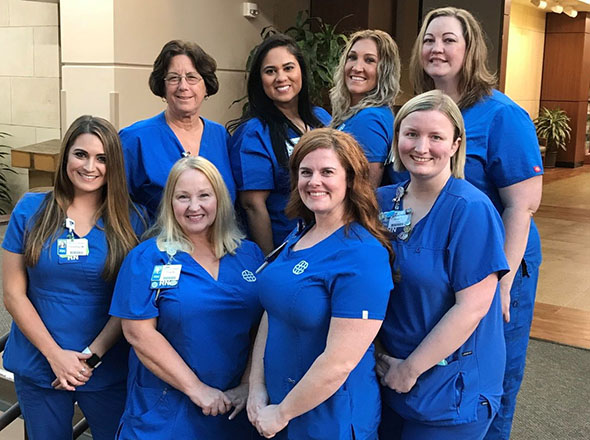No matter how or when a stroke patient arrives at Texas Health Fort Worth, a stroke clinician is ready to provide immediate care.
The hospital, which treats more stroke patients than any other hospital in North Texas*, has five full-time and three PRN nurses who specialize in stroke care and serve as stroke clinicians. It is the only such program in the country, according to Kristin Templin, M.S.N., R.N., nurse manager of Neuro/Telemetry and Stroke Administration at Texas Health Fort Worth.
“In most hospitals, stroke care is provided by a stroke coordinator and Emergency Department (ED) nurses,” Kristin said. “We had seen how effective the trauma and cardiovascular clinicians, who are all registered nurses, were in the ED, and how they have driven practice and outcomes for those programs. We wanted to implement something similar.

“Because there is such a strict timeline for stroke patients, we felt that it would be most effective if we had a nurse facilitating the care along with physicians on the medical staff and bedside nurses.”
When emergency medical technicians (EMTs) treat someone having a stroke, they call the ED charge nurse at Texas Health Fort Worth, confident that a stroke clinician will be there to greet them.
“The charge nurse will page the stroke clinician with an estimated time of arrival, so the stroke clinician can be there when the patient comes in and start assessing the patient along with the bedside nurse, and communicating with the physician,” Kristin said.
If the patient comes in on their own, a triage nurse will call for the stroke clinician.
And when a stroke patient is transferred to Texas Health Fort Worth from another facility, the stroke clinicians are involved every step of the way.
“James Ryan (M.S.N., APRN, AGCNS-BC, SCRN, stroke coordinator) has worked with the Patient Logistic Center (PLC) to change our communication practices,” Kristin said. “The PLC includes the stroke clinician in the physician-to-physician phone call, so the stroke clinicians are looped in while a plan of care is being formulated.”
This allows the stroke clinicians to prepare for the patient’s arrival, gathering any needed supplies and assembling a care team. They also can advise the other facility about what to do before the patient leaves.
The stroke clinicians all have years of experience in neurology. Some are stroke-certified, but others are certified in related fields such as critical care.
“They understand and recognize strokes,” Kristin said. “They’re excellent at neuro assessments, knowledgeable in the care of stroke patients, and are considered our stroke experts. They understand the guidelines and work very closely with physicians in recognizing symptoms that can be very complicated.”
The stroke clinicians have earned the respect and trust of other caregivers, she said.
“Neurologists know that those nurses are at the bedside,” she said. “They know they’re going to get called when they need to be. And the physicians in the ED feel more comfortable making the decisions they need to because they have an expert at the bedside.”
When they’re not working with stroke patients, the nurses work on data collection and chart reviews, Kristin said.
The program launched in May 2017, Kristin said. She and James are presenting a poster about it at the national Magnet® conference this month in Denver.
“Our stroke outcomes have improved,” Kristin said. “We’ve decreased our door-to-needle times and improved our comprehensive core measures.
“They’ve definitely proven their worth.”
*Source: Statistical information provided by Texas Health Care Information Collection.
by Robin P. Loveman •Posted October 30, 2018

